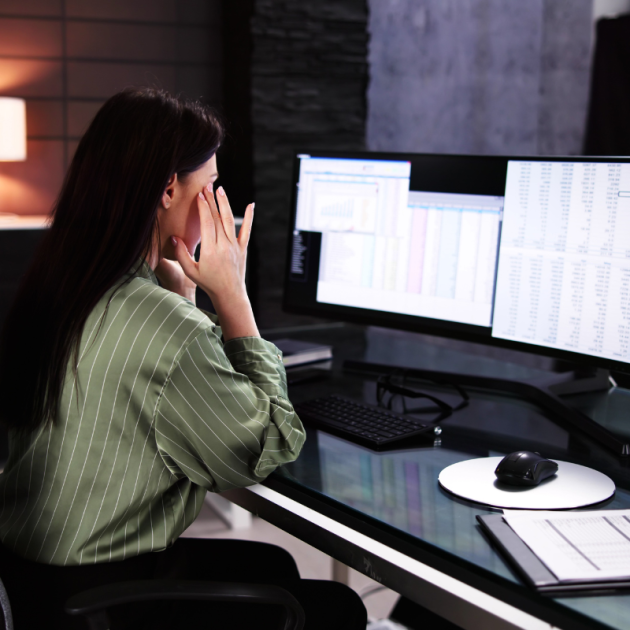How do I know if I need glasses
Feb 07, 2024 in Eye Care

If you’ve recently found yourself squinting at the words in a book, struggling to keep details in focus, or needing to hold your phone closer or further away from your face than normal, you’re probably wondering if you need glasses.
In this guide, we will go through the common signs of needing glasses and the importance of having your eyesight checked by an optometrist to assess whether you need glasses.
Common Signs of Vision Issues
Blurry vision, headaches, and a difficulty seeing clearly are all common symptoms of eyesight issues. But there are some other symptoms that might surprise you that are an indication that you need glasses.

Having trouble focusing on things up close, like when you're reading?
If you’re struggling to see clearly when focusing on close tasks such as reading and crafting, or if you have to hold your phone at arm’s length to read text messages, this is a sign you may have presbyopia, or far sightedness.
Presbyopia is the gradual loss of your eyes' ability to focus on nearby objects. It's a natural, but annoying part of ageing.
Struggling to see or drive well at night
If navigating your way to the bathroom at night or driving in the dark feels more difficult than it used to, or if you have trouble making out objects, street signs, and licence plates in the dark, you might have early cataracts which can give you difficulty driving at night and glare when looking at lights.
Finding it hard to see things in the distance
If you’ve noticed that objects and people in the distance have become harder to see clearly or you are having difficulty reading street signs or billboards, you may be experiencing myopia – or nearsightedness. Other causes for blurry distance vision can include hyperopia – farsightedness, astigmatism, or cataracts.
Occasionally seeing double
Seeing double can be concerning as it can be a symptom of a serious underlying issue. So if you start seeing double, avoid driving and make an appointment with your doctor as soon as possible who will send you to an optometrist to help rule out decompensating heterophoria. Some of the causes of double vision can include cataracts, eye dryness, infections, keratoconus, scars on the cornea and muscle weakness. But some serious illnesses like diabetes, high blood pressure or other illnesses may also be the cause.
Feeling your eyes get tired, especially when you've been staring at screens

Eye strain is a very common issue. Between our phones, laptops, TVs, and other screens in our daily life, eye strain is a common problem for many people. Eye strain can impact your routine and productivity, inhibiting your ability to focus or making you feel tired more quickly. Symptoms of eye strain include dry eyes, itchy eyes, burning eyes, or watery eyes. It can also cause headaches, soreness in your neck, shoulders, and back, and even a sensitivity to light.
Squinting or narrowing your eyes to see things better
If you have to squint or narrow your eyes to bring things into focus, this is an obvious sign that you might need glasses.
Dealing with blurry, fuzzy, or distorted vision
Blurry vision is often related to astigmatism and long or short sightedness. It makes things seem out of focus and might also be a sign of fatigue or eye strain. Sometimes, resting can help. But, if your vision fails to improve, it’s best to go for an eye test to find out if you need glasses or not.
Having a tough time adjusting your sight between different distances
Having difficulty adjusting the focus of your eyes between different distances can often be another sign of eye coordination issues, long sightedness, or presbyopia.
Getting frequent headaches

Getting frequent headaches
Frequent headaches can be another symptom of eye strain. But they can also be a sign of many other things and may not be related to eyesight at all. When you experience new headaches, it is wise to arrange an eye examination to rule out eye problems. While on some occasions a cause may be found, often, further investigation is required by your GP to identify the underlying cause.
Please bear in mind that just one or two of these symptoms may not mean you need glasses or be cause for concern, but if you experience a few or more at a time, it’s often a good indication that your eyesight needs testing.
Understanding Eye Conditions
Nearsightedness – This means that you struggle to see things at a distance but close up objects are clear. Farsightedness – The opposite of nearsightedness, this condition means you might see better at a distance than near.
Astigmatism – Astigmatism means that your eyes don’t focus evenly, and frequently have two (or sometimes more) focal points across their surface. People with astigmatism often see distorted images and can have difficulty with reading on screens. Presbyopia – A natural deterioration in your eyesight as you age. It usually affects people over the age of 40 and typically requires corrective glasses, contact lenses or surgery.
When to See an Eye Care Professional
- You should see an optometrist if:
- You have persistent problems with your vision
- You have sudden changes in your vision
- You have a family history of eye issues
- You work with screens regularly

Importance of Regular Eye Exams
It’s important to get regular eye check ups to maintain your overall eye health. But particularly important if you suspect your eyesight has changed in some way, or if you have an eye condition or history of family ocular issues that needs monitoring. Regular eye tests can help detect issues early, even if there are no apparent symptoms.
Tips for Eye Care To Help Your Vision
Taking care of your eyes is important for maintaining their health.
- During screen use such as during work, it’s recommended that you make sure to take regular breaks (every 20 minutes) to look into the distance and rest your eyes for 20 seconds.
- Protect your eyes from UV rays by wearing sunglasses that have UV blocking features.
- Maintain a healthy diet with plenty of fruits and vegetables.
Conclusion
Making sure you stay on top of your eye health is vital. And part of doing that is with regular eye tests. If it’s been a while since you last had your eyes tested you feel like there has been a recent change in your vision book an appointment for a Leighton’s Eye Test today.

